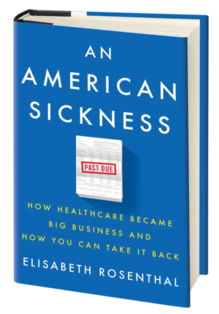Dead weight
 "How much does it cost?" I asked a US friend about her supply of a medication I'm familiar with.
"How much does it cost?" I asked a US friend about her supply of a medication I'm familiar with.
"I don't know," she said. After reading former New York Times reporter Elisabeth Rosenthal's new book An American Sickness, I understand better: no one connected with the American medical system knows how much anything costs. Even the uninsured, who are paying out of pocket, don't know the cost of anything. They only know what they're charged, a very different thing. Spoiler: they pay the most because they have no purchasing power.
 In American health care economics, everything works backwards to the way you think it works. "Prices," Rosenthal writes in the tenth of her 11 laws of US health care economics, "rise to what the market will bear." Among the others: "More treatment is always better" and "a lifetime of treatment is preferable to a cure". In addition: treatments and medications can get more expensive as they age; economies of scale give providers the market power to charge more; more competition can send prices up as well as down. Rosenthal proceeds to document how all these rules work out in practice in eye-popping detail. We all know Americans pay more for health care, but Satan lurks in Rosenthal's thousands of details.
In American health care economics, everything works backwards to the way you think it works. "Prices," Rosenthal writes in the tenth of her 11 laws of US health care economics, "rise to what the market will bear." Among the others: "More treatment is always better" and "a lifetime of treatment is preferable to a cure". In addition: treatments and medications can get more expensive as they age; economies of scale give providers the market power to charge more; more competition can send prices up as well as down. Rosenthal proceeds to document how all these rules work out in practice in eye-popping detail. We all know Americans pay more for health care, but Satan lurks in Rosenthal's thousands of details.
Rosenthal hopes to start a loud conversation to foster change. Such proposals are up against more than just the post Citizens United influx of corporate money into politics. For one thing, we tend to believe that more expensive must mean "better". Telling Americans their health care is the most expensive in the world fails as a strategy because many then think that means it must be the best, even if not everyone can access it. And there's confirmation bias: every infant mortality or life expectancy figure can be countered with a cancer survival rate or waiting list. We can't make them love the NHS.
 Tying health insurance to employment as an aspirational benefit - a stroke of evil genius - kept health separate from human rights. Viewing health insurance as something you earn out of merit helps create and extend the social divisions we see every day. In another part of our brains, we know that sick people are rarely in a position to act as responsible consumers. You can't shop around for a cheaper surgeon in the middle of a heart attack or ask detailed security questions about your pacemaker's design before installation. Instead, you wrangle with your insurance company after those decisions have been made. The bit of good news there is that the insurance company can't actually repossess your cancer treatment. The bad news is that more than 50% of American bankruptcies are among people who *have* health insurance, and it's distressingly easy for some people to reach the maximum lifetime payout. In Girl in Glass, Deanna Fei writes about the medical meaning of "catastrophic": unexpected and unpredictable, rather than devastating, as it applied to her terrifyingly premature daughter, one of the two "distressed babies" the AOL CEO said cost $1 million each. Even for insured Americans, the burdens of health crises are often financially "catastrophic" in both that sense and the more usual "disaster" sense as well.
Tying health insurance to employment as an aspirational benefit - a stroke of evil genius - kept health separate from human rights. Viewing health insurance as something you earn out of merit helps create and extend the social divisions we see every day. In another part of our brains, we know that sick people are rarely in a position to act as responsible consumers. You can't shop around for a cheaper surgeon in the middle of a heart attack or ask detailed security questions about your pacemaker's design before installation. Instead, you wrangle with your insurance company after those decisions have been made. The bit of good news there is that the insurance company can't actually repossess your cancer treatment. The bad news is that more than 50% of American bankruptcies are among people who *have* health insurance, and it's distressingly easy for some people to reach the maximum lifetime payout. In Girl in Glass, Deanna Fei writes about the medical meaning of "catastrophic": unexpected and unpredictable, rather than devastating, as it applied to her terrifyingly premature daughter, one of the two "distressed babies" the AOL CEO said cost $1 million each. Even for insured Americans, the burdens of health crises are often financially "catastrophic" in both that sense and the more usual "disaster" sense as well.
Even Rosenthal, however, does not fully recognize the cost of health care to Americans. Employers' involvement in providing health insurance for their employees helps them justify drug testing, and has consequences for medical privacy. People like Fei's husband find their most sensitive health information open to their employers, especially when these self-insure, hiring a third-party insurer just to handle administration. In recent years, Health Privacy Summit speakers have deplored employers' access to staff health data through "Wellness" programs, which aren't protected by the 1996 Health Insurance Portability and Accountability Act (HIPAA). Patients lose privacy under other regimes, too; but the *consequences* of health privacy breaches are less severe when employers aren't financially motivated to fire (or not hire) their most vulnerable employees.
There are also broader costs. In 1987, when Peter Skrabanek first warned of the risks that screening mammograms would increase over-treatment and patient distress, the general response was that the saved lives would be worth the cost. Today, doctors are concluding that Skrabanek was right.
In his recent book, Move Fast and Break Things, Jonathan Taplin recounts the story of The Band member Levon Helm, who was forced to keep touring while seriously ill with esophageal cancer because he needed the money for medical bills. A European might blame the lack of nationalized health care. Taplin focuses on internet companies, which he blames for the music industry's post-Napster dropping revenues. Later in the book, Taplin argues that a future in which robots and AI have taken most jobs will require a universal basic income and free health care - but still doesn't connect it to Helms's plight. For Taplin, the solution is to restore Helm's royalty stream.
The global dominance of American technology companies means we all feel the consequences of the demographics of US start-up culture - which is predominantly a youth culture in part because hardly anyone old enough to contemplate having children can afford to risk their medical insurance. Finally, the expanding cost is a drag on the overall economy. Meanwhile, the cost is measured in human lives.
Illustrations: Hospital pictogram; Elisabeth Rosenthal; An American Sickness.
Wendy M. Grossman is the 2013 winner of the Enigma Award. Her Web site has an extensive archive of her books, articles, and music, and an archive of earlier columns in this series. Stories about the border wars between cyberspace and real life are posted occasionally during the week at the net.wars Pinboard - or follow on Twitter.